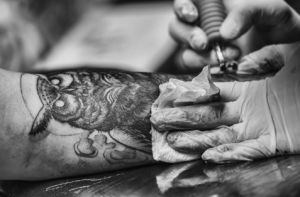
By Kurt Valentine, Staff Writer
Throughout the 1800s, Americans attended traveling circuses that “showcas[ed] stunning tattooed [women] to amazed audiences”.[1] Tattooed people were viewed as entertainment; they were human oddities.[2] Perceptions changed, tattoos have moved into the mainstream. In 2015, a Harris Poll asked Americans if they would be comfortable seeing a person with visible tattoos serving in different roles and professions.[3] The survey revealed comfort ranges from 86% for athletes to 59% for primary teachers and judges, and 58% for presidential candidates.[4] Americans are not only comfortable with tattoos, but more Americans are getting tattoos, especially Millennials.[5] In 2011, 21% of Americans had at least one tattoo, four years later that number increased to 29%.[6]
The growth of the tattoo industry reflects the increased popularity. In 2016, IBIS World estimated that America’s tattoo industry was a one-billion-dollar industry.[7] As with any growing industry, laws can be slow to react to the legal difficulties encountered in that industry. With the tattoo industry, the focus is on copyright laws.
Copyright protection, “subsists . . . in original works of authorship fixed in any tangible medium of expression, now known or later developed, from which they can be perceived, reproduced, or otherwise communicated . . .”[8] In 1998, the Copyright Term Extension Act, also known as the Sonny Bono Copyright Term Extension Act, was passed.[9] Now, copyright protection lasts for the life of the author plus 70 years.[10]
Copyright laws protect tattoos. A tattoo artist creates an original work and fixes it to a tangible medium, human skin. There are two high-profile cases that reflect how copyright laws apply to tattoos.
Following the Detroit Pistons 2004 NBA championship, professional basketball player Rasheed Wallace appeared in an advertising campaign with Nike, Inc.[11] The advertisement featured a close-up of Wallace’s tattoo and included a voice-over of Wallace describing the tattoo.[12] Matthew Reed, Wallace’s tattoo artist, registered a copyright for the tattoo after seeing the advertisement. Reed filed a complaint against Nike, the advertisement agency, and Wallace alleging copyright infringement. The case was dismissed, presumably pursuant to a settlement.[13]
The most well-known claim for copyright infringement involving tattoos was filed by S. Victor Whitmill, the artist that tattooed Mike Tyson’s face.[14] Shortly before the release of “Hangover Part II,” Whitmill filed a complaint against Warner Bros. because one the characters in the movie gets an exact copy of Tyson’s tattoo.[15] Whitmill had a release signed by Tyson that provides, “all artwork, sketches and drawings related to my tattoo and any photographs of my tattoo are property of [Whitmill’s Studio]”.[16] The parties settled for undisclosed amount and the case was dismissed.[17] The judge did state that there “was a strong likelihood of prevailing on the merits for copyright infringement”.[18]
Most people that get tattooed are not famous and really have no need to get the copyright rights transferred. Additionally, most tattoo artists do not have clients sign a release form containing the provision Mike Tyson signed.[19] Christopher A. Harkins, an attorney that specializes in litigation involving copyright, suggested that anyone with an expectation of fame should have the tattoo artist transfer ownership of the copyright.[20]
In both cases set forth above, the remedy for infringement was clear. Both cases had large corporate defendants that were using the tattoos for commercial purposes. But fashioning a remedy for other cases might pose some ethical issues. In Matthew Beasley’s survey of tattoo artists, “three artists expressed their feelings that tattoo removal is too extreme a remedy for their liking; thus, it is unlikely that tattoo artists would even pursue it”.[21] As the tattoo industry continues to grow, these issues will evolve. Jordan Hatcher predicted that “cases and issues concerning tattoos and intellectual property may soon become more commonplace”.[22]
Sources
[1] https://www.tattoodo.com/a/2016/01/the-art-of-tattooed-performers-from-vintage-freaks-to-suspension-art/
[2] Id.
[3] http://www.theharrispoll.com/health-and-life/Tattoo_Takeover.html
[4] Id.
[5] Id. (47% of Millennials have at least one tattoo, 37% have more than one)
[6] Id.
[7] https://www.bloomberg.com/news/articles/2017-06-07/now-everyone-s-getting-tattooed-this-startup-is-digitizing-the-industry
[8] 17 U.S.C.S. § 102 (LexisNexis, Lexis Advance through PL 115-64, approved 9/29/17)
[9] [SONNY BONO COPYRIGHT TERM EXTENSION ACT; FAIRNESS IN MUSICAL LICENSING ACT OF 1998], 1998 Enacted S. 505, 105 Enacted S. 505, 112 Stat. 282.
[10] Id.
[11] TATTOOS AND COPYRIGHT INFRINGEMENT: CELEBRITIES, MARKETERS, AND BUSINESSES BEWARE OF THE INK, 10 Lewis & Clark L. Rev. 313, 315.
[12] Id.
[13] Id. at 317.
[14] http://www.foxnews.com/entertainment/2011/06/21/mystery-settlement-in-hangover-2-tattoo-lawsuit.html
[15] Id.
[16] Matthew Beasley, WHO OWNS YOUR SKIN: INTELLECTUAL PROPERTY LAW AND NORMS AMONG TATTOO ARTISTS, 85 S. Cal. L. Rev. 1137, 1148.
[17] Id.
[18] Id.
[19] Id.
[20] Christopher A. Harkins, TATTOOS AND COPYRIGHT INFRINGEMENT: CELEBRITIES, MARKETERS, AND BUSINESSES BEWARE OF THE INK, 10 Lewis & Clark L. Rev. 313, 328.
[21] Matthew Beasley, WHO OWNS YOUR SKIN: INTELLECTUAL PROPERTY LAW AND NORMS AMONG TATTOO ARTISTS, 85 S. Cal. L. Rev. 1137, 1161.
[22] Id. at 1152.